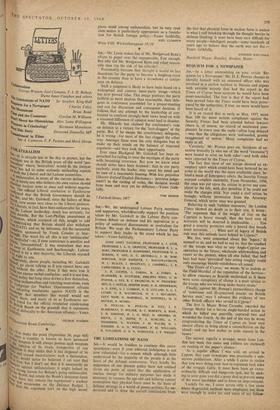SIR, —Mr. Levin makes fun of Mr. Wedgwood Benn's efforts to
paper over the unpaperable. Fair enough. But why did Mr. Wedgwood Benn and other reason- able men run the risk of his ridicule?
Presumably because they thought it would be less disastrous for the party to become a laughing-stock in the country than to have a showdown at confer- ence on defence.
Such a judgment is likely to have been based on a widespread and curious inner-party image—which has now proved false. This image portrays the party faithful as more zealous than reasonable, their dele- gates in conference assembled for a prayer-meeting and not for discussion and consequent decision. It follows that any attempt by the leadership at con- ference to confront strongly-held views head-on with a reasoned difference of opinion must lead to disaster.
Mr. Mikardo has claimed the conference's vote on defence as a victory for the 'foot-sloggers' of the party. But, if he means the constituency delegates, he is wrong—for most of the feet slogged the other way. Amongst these were the only delegates free to make up their minds on the balance of reasoned argument—and they took their opportunity.
Ever since Blackpool Mr. Gaitskell has been re-
proached for failing to treat the mystique of the party with becoming reverence. But now we know what should never have been doubted: that in our party anybody, even the leader, may speak his mind and be sure of a reasonable hearing. With less prejudice (Shorter Oxford English Dictionary: 'previous judge- ment') in the casting of votes, the decision would have been and may yet be different.—Yours faith- fully.
5 Fairholt Street, SW7 TOM BISHOP






































 Previous page
Previous page